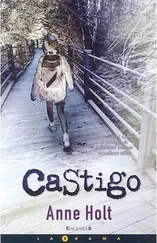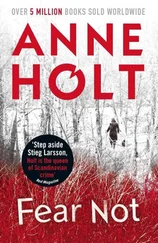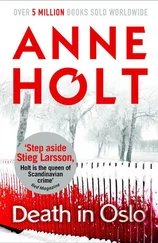“What do you want an answer to?”
“Was it really so important for Jørgen Lavik to kill Karen Borg? I mean, did his case depend so very much just on her?”
“No.”
“No? Just no?”
“Yes.”
It pained him to discuss her. He’d limped over twice to the hospital ward where she was lying bruised and helpless. Her husband had been there both times. With a hostile look and demonstratively holding her pale hands as they lay on the bedcover, Nils had by his very presence thwarted any attempt at saying what Håkon actually wanted to say. She had been distant and discouraging, and though he hadn’t expected any thanks for his lifesaving intervention, it hurt him deeply that she didn’t even mention it. Nor did Nils for that matter. All Håkon did was exchange a few meaningless words for five minutes and then leave again. After the second visit he couldn’t face another; since then not a moment had passed without his thinking of her. Nevertheless he was able to take some comfort from the fact that the case was more or less solved. He just couldn’t bear talking about her. But he made a supreme effort.
“We wouldn’t have got a conviction even with Karen’s statement and testimony. It could only have helped us procure an extension of the custody order. When he was first released, Karen’s role was irrelevant, unless we’d found additional evidence. But Lavik was probably not fully responsible for his actions.”
“Do you mean he wasn’t of sound mind?”
“No, not that. But you have to remember that the higher you are, the further you have to fall. He must have been rather desperate. In one way or another he’d convinced himself that Karen was dangerous. From that point of view it makes sense when our superiors maintain that he was the one who knocked you out. That memo may have caused his obsession.”
“So now it’s my fault that Karen was nearly murdered,” said Hanne peevishly, though she knew he hadn’t meant it like that.
She wound down the window, pressed a red button, and announced her business to a voice of indeterminate sex that crackled out at them from a perforated metal plate. The barrier was raised by unseen hands and she was directed to an empty space in the garage underneath the parliament building.
“Kaldbakken is seeing us straightaway,” she said, assisting her colleague out of the car.
* * *
It was hard to imagine how a minister of justice could tolerate such wretched conditions. Despite the fact that the room was being redecorated, it was obvious that the youthful minister was still in residence. He stepped over rolls of wallpaper, squeezed past a stepladder on the top of which a can of paint was ominously teetering, gave them a beaming smile, and proffered his hand in greeting.
He was strikingly handsome as well as surprisingly young. He’d only been thirty-two when he took office. He had golden blond hair, even in midwinter, and his eyes could have been a woman’s: large, blue, and with very long, beautifully curling lashes. His darker eyebrows, meeting above the bridge of his nose, formed a stark masculine contrast to all this lightness.
“Wonderful that you could come,” he said enthusiastically. “After everything there’s been in the papers over the past week it’s difficult to know what to believe. I’d be grateful for a briefing. Now that it’s all over, I mean. Quite an incredible affair, and very uncomfortable for us upholders of the law! I’m the one who’s supposed to be responsible for these lawyers, and it’s a nasty business when they hop over the fence.”
His grimace was presumably meant as a fraternal gesture of acknowledgement of the state of the legal profession. The minister had been in the police force himself for three years before his appointment as a public prosecutor in record time at the age of only twenty-eight. He helped Håkon solicitously with one of his crutches that had dropped to the floor as they shook hands.
“Quite a spectacular rescue, I understand,” he said as a friendly overture, pointing at Håkon’s leg. “How are you getting on?”
Håkon assured him that he was fine. Just a little pain still, but otherwise all right.
“Let’s go in here,” the minister said, leading them into the adjacent room. Unlike his own it looked out not over the gigantic building site-where they were at long last trying to make something of what had for so long been a hole in the ground-but onto the helicopter landing pad on the roof of the Department of Trade and Industry.
This room was no bigger, only tidier. There were two magnificent Oriental rugs on the floor, and one of them must have been more than four square metres. They couldn’t possibly be public property. Nor did the paintings on the wall look as if they belonged to the State; if so, they should have been in the National Gallery.
The parliamentary under secretary came in immediately behind them. Since it was his office, he drew up chairs and offered them mineral water. He was twice the age of his boss, but just as jovial. His suit was tailor-made, emphasising the fact that he hadn’t given up the expensive habits acquired during thirty years as a successful barrister. His official salary was probably only pocket money for him, since he was still senior partner in a moderate-sized but much more than moderately prosperous law firm.
The account of events took a good half hour, and it was mainly Kaldbakken who did the talking. Håkon was dozing off by the end. Embarrassing. He shook his head and took a swig of mineral water to keep himself awake.
The reddish, richly patterned rugs were beautiful. From this side they appeared a different shade than from the door: warmer and deeper. The wall shelving seemed more in keeping with the office, a dark brown plain veneer, full of legal books. Håkon had to smile when he saw that the under secretary also had a penchant for old children’s books. There was someone else who had, he remembered, though the powerful medication he was taking was affecting his ability to concentrate. Who was it?
“Sand?”
He gave a start, and made the excuse of his leg. “Sorry. What was the question?”
“Do you agree that the case is solved now? Was it Lavik who killed Hans Olsen?”
Hanne was gazing into the distance with an inscrutable countenance. Kaldbakken nodded decisively and looked him straight in the eyes.
“Well, maybe. Presumably. Kaldbakken thinks so. He’s probably right.”
Correct answer. The others began to gather up their things; they’d been there longer than planned. Håkon heaved himself up and limped over to the bookshelves. Then he remembered.
He felt quite dizzy for a moment and put too much weight on one crutch, which skidded away from him on the shiny floor: he went down with a crash. The under secretary, who was standing nearest, rushed across.
“Steady on, old chap,” he said, offering his hand.
Håkon ignored it, staring at him in consternation for so long that Hanne had time to come over and get her arms round him. He struggled to his feet.
“I’m okay,” he muttered, hoping they would ascribe his confusion to the heavy fall.
After a few more expressions of gratitude they were free to go. Kaldbakken had his own car. When Hanne and Håkon were out of earshot, he tugged at her jacket.
“Fetch those three sheets of code. Meet me at the Central Library as soon as you possibly can.”
With that he hobbled off across the asphalt on his crutches at impressive speed.
“I can drive you,” she shouted after him, but he seemed not to catch it. He was already halfway there.
* * *
It was very worn, but the picture on the cover was still clear. A handsome young European pilot lay helpless on the ground in his blue flying suit and old-fashioned leather helmet, being attacked by a savage horde of hostile black Africans. The book was entitled Biggles Flies South . He passed it to Hanne, who was still out of breath. She realised at once.
Читать дальше












